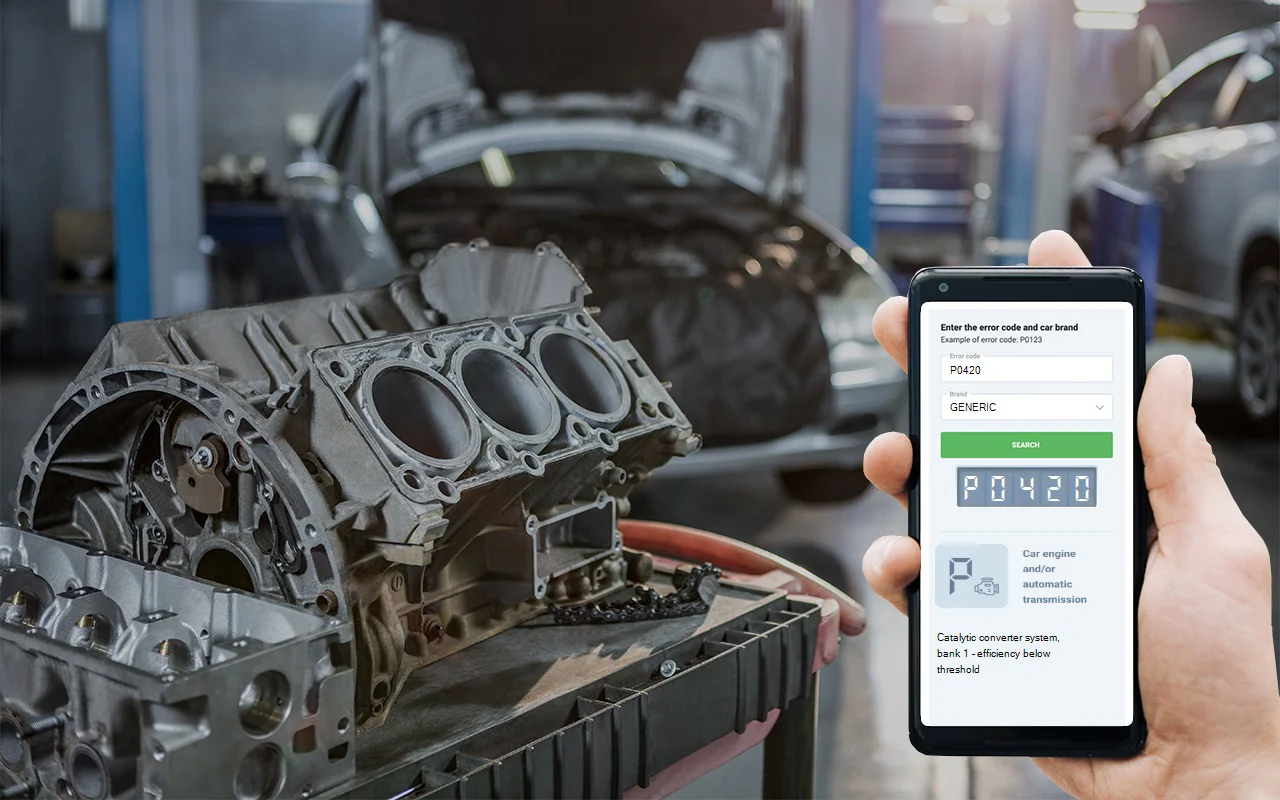Causes of OBD P0420
The P0420 error code can occur for various reasons, including the following:
- Inefficient catalytic converter: Wear or damage to the catalytic converter can reduce its efficiency. This can occur due to wear or exposure to high or low temperatures.
- Faulty oxygen sensor: The oxygen sensor measures the oxygen content in the exhaust gases and transmits data to the ECM. If the sensor is faulty, it may transmit incorrect data, leading to the P0420 error code.
- Exhaust leaks: Air entering the system due to leaks can cause incorrect readings from the oxygen sensor.
- Fuel system issues: Problems in the fuel system, such as faulty injectors or clogged filters, can lead to increased emissions.
- Ignition system problems: Malfunctioning ignition components, such as faulty spark plugs or ignition coils, can increase emissions.
In short, the P0420 error code indicates issues with the catalytic converter. To avoid further problems with the vehicle, it's important to identify and address the cause of this malfunction promptly.
Symptoms of Error P0420
When driving a vehicle with the P0420 error code, you can expect the following:
- Standard drivability: Typically, a faulty catalytic converter does not affect the drivability of the vehicle.
- Check Engine light: The "Check Engine" light may illuminate due to the P0420 error code.
- Reduced power after warming up: Power loss may occur during acceleration after the vehicle warms up.
- Acceleration issues: There may be difficulties in reaching speeds of 50-65 kilometers per hour.
- Smell of sulfur or "rotten egg": There may be a sulfur or "rotten egg" smell coming from the exhaust pipe.
These signs may indicate problems with the catalytic converter and may require attention and repair to ensure the proper functioning of the vehicle.


Common Mistakes When Dealing with OBD Code P0420
It is common for technicians or mechanics to replace the oxygen sensor or catalytic converter without conducting a thorough diagnostic of the vehicle to identify all possible issues. If the cause of the P0420 code is another problem, such as a fuel injector leak or oil contamination in the catalytic converter, replacing only the oxygen sensor or the catalytic converter without addressing the root cause can be an expensive mistake.
In such cases, it is important to conduct comprehensive diagnostics to pinpoint the source of the problem and take appropriate action. This will help avoid unnecessary costs for replacing expensive parts that may remain faulty due to other issues within the vehicle system.

How to Fix the P0420 Code?
When the Engine Control Module (ECM) detects insufficient performance of the catalytic converter on bank 1, which is displayed as the P0420 code, it can be caused by a faulty catalyst or a false alert from the O2 sensor. Let’s consider the two main ways to resolve this issue: DIY solutions and seeking professional help.
DIY Solution
If you have some automotive repair knowledge, try the following methods to solve the P0420 problem:
- Replace the O2 sensor: Replacing this sensor may resolve the P0420 issue if it was caused by a malfunctioning sensor. Pay attention to the sensor located behind the catalytic converter to save time and money.
- Clean the catalytic converter: Sometimes a dirty or blocked catalytic converter can trigger the P0420 code. Try cleaning it with a catalytic converter cleaner. However, this is not always an effective method.
- Check for exhaust leaks: Also, check for possible leaks in the exhaust system, which can cause the P0420 code. If you find any, fix the issue.
Seeking Professional Help
If DIY solutions don’t help or you’re unsure of your actions, it’s better to consult experts:
- Visit a mechanic: A mechanic can determine the root cause of the P0420 issue and suggest the appropriate solution. This may involve replacing the catalytic converter, which, although expensive, is a long-lasting option.
- Use specialized services: Several companies offer services to fix the P0420 problem. They use advanced technologies to restore the efficiency of the catalytic converter. However, these services can be costly and not always effective.
In summary, solving the P0420 problem requires finding the root cause and taking the necessary steps. Whether you choose DIY methods or seek professional help, be sure to rely on trusted sources and follow the appropriate procedures.
Preventing the P0420 Code
To avoid encountering the P0420 problem, follow these tips:
- Regular maintenance: Perform regular maintenance on your vehicle to avoid issues.
- Driving habits: Avoid sudden starts and stops, maintain moderate speed, and avoid overloading your vehicle.
By following these tips, you can prevent the P0420 issue and ensure smooth operation of your vehicle.
Conclusion
The P0420 error code indicates that the Engine Control Module has detected a problem with the catalytic converter. This issue can have various causes, including damage to the catalytic converter or an incorrect signal from the oxygen sensor.
To prevent further damage to the exhaust system and potential engine problems, it is important to address this issue as soon as possible, especially if the cause is catalytic converter damage. A damaged catalytic converter can increase emission levels, making it a crucial component in the exhaust system for reducing harmful gas emissions.
The P0420 code requires thorough analysis to determine its causes, as there can be many contributing factors to this issue. For accurate diagnosis and further resolution, it is best to consult an experienced specialist.
Video for "Error p0420" on YouTube
The following error codes are often searched for
OBD P0420 code analysis and solutions
The page presents a in-depth analysis of code P0420 for Opel, Renault, VW (Volkswagen), Ford, Peugeot, Mitsubishi, Skoda, BMW, Citroën, Toyota, Lada, Honda, Kia, and other models to analyze potential factors and solutions related to OBD-2 errors, with emphasis on the issue. We offer engineering documentation and approaches for diagnostics to identify and resolve the issue effectively. Our resource is designed to be a comprehensive source of information on OBD 2 errors, providing you with the necessary tools for successful repair and maintenance of your vehicle. If during the fixing of OBD2 codes you need to purchase parts, don’t forget to check out Avtopro!







